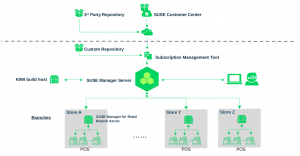Enabling the point of service environment of a modern retailer
 The plethora of challenges confronting the retailers, in this post-Amazon era, have made it incumbent upon these retailers to transform their business models, in order to generate sustainable growth. Customer preferences and shopping behavior have been evolving at a frantic pace. This new channel-agnostic customer expects the shopping experience to be personalized and seamless across the different points of engagement which the retailer has to offer. The leading retailers are embracing this change. They are adapting their business processes and IT infrastructure to serve the needs of this evolving customer.
The plethora of challenges confronting the retailers, in this post-Amazon era, have made it incumbent upon these retailers to transform their business models, in order to generate sustainable growth. Customer preferences and shopping behavior have been evolving at a frantic pace. This new channel-agnostic customer expects the shopping experience to be personalized and seamless across the different points of engagement which the retailer has to offer. The leading retailers are embracing this change. They are adapting their business processes and IT infrastructure to serve the needs of this evolving customer.
We at SUSE, have been leveraging open source technologies to deliver products that will support this transformation in the retail sector, across different areas in their IT infrastructure. One of those areas, and the focus of this post, is the point of service.
Gone are the days when the point of service was a simplistic cash register. The point of service systems of today offer a platform for comprehensive customer engagement, inventory management, reporting and so forth. These systems could be a standard point of service terminal, a self-checkout system, a kiosk or a mobile point of service device carried across the store by a sales executive. The reliability and stability of these systems, is more critical today than it has ever been. A loss of a system today does not merely mean a cash counter ‘going down’, which in itself is nothing short of a tragedy, in terms of the business loss that could ensue. However, a loss of a system today implies that a comprehensive engagement point in the shopper’s journey has been lost.
With the SUSE Linux Enterprise Point of Service, we offer a stable, secure and reliable operating system platform for these point of service systems. At the same time, we also recognize that something which remains a constant in this industry, is the importance of long term stability of the entire point of service stack. Frequent re-deployments of newer versions of an operating system on the point of service devices, because the older version has gone out of support, is not an ideal scenario.
In some cases, this need for stability, stems from the need to maintain the entire stack at the point of service for a long term. This is required in order to minimize the operating expenses that originate from re-deploying and setting up the point of service environment over and over again. The possible incompatibilities with the software application stack, the peripheral devices, and the effort needed to deliver that compatibility, adds to the cost pressures. In other cases, the need for stability is more a consequence of the lack of availability of a solution, that can manage the entire life-cycle of the point of service asset – from provisioning, to package management, to patching, to configuration, to monitoring and finally re-deployment.
We are delivering products that would address the concerns of both these sets of customers. For the former cases, we are committed to supporting SUSE Linux Enterprise Point of Service for extended periods, at the point of service client devices. The aim is to allow the retailers to exploit the full life-cycle of their deployed hardware, thereby maximizing the return on their investments at the point of service. The latest SUSE Linux Enterprise Point of Service release to be supported for an extended period on the client devices, is SUSE Linux Enterprise Point of Service 12 Service Pack 3. We will support this version, on certified point of service hardware, until March 31, 2025. The product life-cycle details can be found here. These 64-bit client images can be built using the SUSE Linux Enterprise Point of Service Image Server 12 component.
At the same time, with the introduction of SUSE Manager into our retail offering, we are enabling the retailers to manage their dispersed store assets, throughout the life-cycle of those assets. This product offering is called SUSE Manager for Retail, something I introduced in one of my earlier blog posts.

SUSE Manager for Retail reference architecture
So whether it is about a stable operating system that is part of the point of service stack, or a Linux systems management solution to deploy, manage and monitor that stack, SUSE has a solution to solve the point of service related problems of the modern retailer.
For more information, please visit the SUSE Linux Enterprise Point of Service and SUSE Manager for Retail product pages.
Related Articles
Oct 04th, 2024
No comments yet